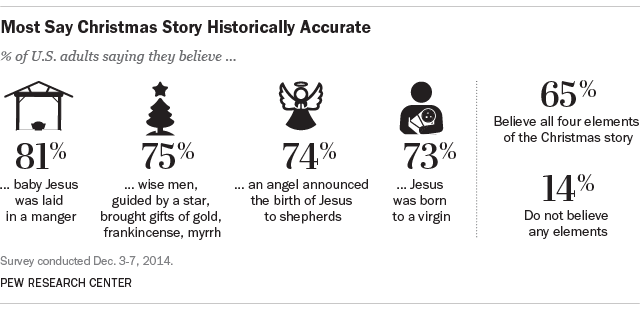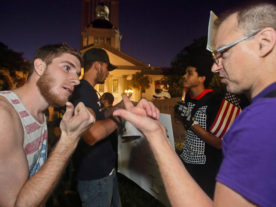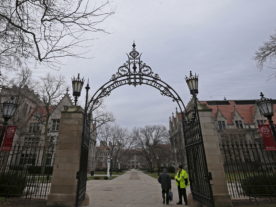
Christmas tree vendors in New York City. (AP Photo)
Christmas is, by definition, a Christian holiday, but it turns out that a vast majority of non-Christians in the United States — 81 percent — also celebrate the Dec. 25 holiday, which commemorates the birth of Jesus.
Muslim American Zina Alathari, a Virginia dentist and mother of three girls, is one of them.
“We celebrate Christmas because it’s a joyous family holiday that brings our family and friends together,” Alathari said. “We are part of this culture and it’s important for my children to enjoy this with their friends.”

American Muslim Dr. Zina Alathari celebrating Christmas with her family.
Alathari joins the 9 in 10 Americans — or 92 percent — who celebrate Christmas, according to the Pew Research Center.
The celebrants include 87 percent of all people with no religious affiliation and about three-fourths of Asian-American Buddhists and Hindus. About one-third of American Jews, many of whom are married to non-Jewish spouses, reported having a Christmas tree in a 2013 survey.
Bruce Ferder, a VOA cameraman who is Jewish, never celebrated Christmas as a child. After a Christian married into the family, though, the Ferders expanded their festivities to include Christmas and Hanukkah.
“We love to celebrate both holidays together. We gather around the tree on Christmas morning and open gifts and celebrate our time together as a family,” Ferder said. “We brought up our children to learn to expand their knowledge in all religions and respect everyone as we want to be respected ourselves.”
Seventy percent of Americans identify as Christians, while non-Christian faiths make up less than 6 percent of the overall U.S. population. These faiths include Judaism (1.9 percent), Islam (0.9 percent), Buddhism (0.7 percent) and Hinduism (0.7 percent). About 1 in 5 Americans does not identify with any religion.
Christians believe Jesus is the son of God. Jesus does not play any role in Judaism, and while Jews may accept that he is an historical figure, they do not believe in his divinity, nor that he was the prophesied messiah. In Islam, Jesus is an important figure. He’s regarded as a prophet, or messenger of God, who was born of a virgin mother. However, Muslims do not believe Jesus was the son of God.
 Alathari, whose children have attended weekly Islamic religious classes, does not see any conflict between her Muslim faith and celebrating Christmas.
Alathari, whose children have attended weekly Islamic religious classes, does not see any conflict between her Muslim faith and celebrating Christmas.
“We celebrate Eid [major Muslim holiday] and Christmas,” she said. “Both holidays are about peace and love and the kids love the gifts.”
About half of Americans see Christmas as more of a religious holiday, while about one-third view it more as a cultural holiday.
Either way, a majority of Americans say they believe the Christmas story reflects actual historical events.
Over the years, many Americans have taken to saying “Happy Holidays” in order to be sensitive to non-Christians.
However, the survey suggests wishing your friends and neighbors a very “Merry Christmas” might be well received by most Americans — no matter what their religion.























This story is more about assimilation than celebration. Or as the Yiddish expression goes: “You can’t dance at two weddings with one behind.”
Sure you can. Just not at the same time.
We were baptized and raised as Christians. We were married in the Evangelist church on the hill in Treysa, Germany. We have always celebrated Christmas as the birthday of Jesus. Christmas is celebrated all over the world by Christians and non-Christians alike, a tradition that is thousands of years old.
It appeals to people with common sense, family, friends, food, gifts. Much better than head chopping or praying to wooden idols.
Christmas, as most people celebrate it, is far more pagan in origin than christian. For a start the date is extremely unlikely to be birthday of Jesus Christ.
The DePascha Computus, an anonymous document believed to have been written in North Africa around 243 CE, placed Jesus birth on March 28. Clement, a bishop of Alexandria (d. ca. 215 CE), thought Jesus was born on November 18. Based on historical records, Joseph A. Fitzmyer – Professor Emeritus of Biblical Studies at the Catholic University of America – guesses that Jesus birth occurred on September 11, 3 BCE.
The date was originally the winter solstice, which was also the original reason for celebration. The date was appropriated by early christians as a day to celebrate Christ’s birth, probably sometime in the early to mid 4th century. The name, “Christ’s Mass,” is not recorded anywhere till the second millenium.
Many of our traditions, like the original pagan celebration itself, are older than Christ – the feast, the tree, gift giving, mistletoe etc.
It’s for these reasons and others that some christians (notably Jehovah’s Witnesses) refuse to celebrate Christmas.
I am not a christian and I’m quite comfortable celebrating Yule, knowing that my ancestors have been celebrating the season for much longer than christianity has been around 😉
We should burn the Christmas trees held by non Christians, with freedom of religion they should refuse to sell Christmas trees to non Christian. Only true Christians should have the right to a Christmas tree like the Duggard family, Kim Davis, Mike Hucklebee and so forth.
I feel better ! now y’all have a merry a Xmas.
The title makes me laugh “Vast Majority of US Non-Christians Celebrate Christmas”. What is Christian about the aspects of Christmas
1. Celebrating Jesus’ birthday: “The early Christians did not celebrate [Jesus’] birth because they considered the celebration of anyone’s birth to be a pagan custom.”—The World Book Encyclopedia.
2. December 25: There is no proof that Jesus was born on that date. Church leaders likely chose this date to coincide with pagan festivals held on or around the winter solstice.
3. Gift-giving, feasting, partying: The Encyclopedia Americana says: “Saturnalia, a Roman feast celebrated in mid-December, provided the model for many of the merry-making customs of Christmas. From this celebration, for example, were derived the elaborate feasting, the giving of gifts, and the burning of candles.” The Encyclopædia Britannica notes that “all work and business were suspended” during Saturnalia.
4. Christmas lights: According to The Encyclopedia of Religion, Europeans decorated their homes “with lights and evergreens of all kinds” to celebrate the winter solstice and to combat evil spirits.
Mistletoe, holly: “The Druids ascribed magical properties to the mistletoe in particular. The evergreen holly was worshiped as a promise of the sun’s return.”—The Encyclopedia Americana.
5. Christmas tree: “Tree worship, common among the pagan Europeans, survived after their conversion to Christianity.” One of the ways in which tree worship survived is in the custom of “placing a Yule tree at an entrance or inside the house in the midwinter holidays.”—Encyclopædia Britannica.
Does God care? Well the bible shows that in Exodus 32:5-7 we offend God if we try to worship him in a way that he does not approve:
“When Aaron saw this, he built an altar before it. Then Aaron called out: “There is a festival to Jehovah tomorrow.” So they got up early on the next day and began offering up burnt offerings and presenting communion sacrifices. After that the people sat down to eat and drink. Then they got up to have a good time.
Jehovah now said to Moses: “Go, descend, because your people, whom you led up out of the land of Egypt, have corrupted themselves.”
All religion believe in the existence of an almighty creator GOD what ever we shall to exhault and glory him it will not be to much.I employ the various religious sect to come together at any given opportunity to worship and praise him
Jesus came to save the whole world not religions. Everyone should celebrate Him.
It is worth noting that one of the titles of Jesus that is recognized by Muslim scholars is ‘the word’ of God, which is deeply meaningful. Another title is ‘the Messiah.’
God is one
Or, as Jesus says in the Gospel: “The Father and I are one” (Jn 10:30).
Funny how satanists arent mentioned here when a huge percentage is just that including our own Government. As time goes on we will start seeing the satanic agenda being shoved down our throats and Christmas taken from us altogether. Mark my words. The symbolism is everywhere. If you are atheist and searching for proof of God in your life, start with getting baptized. Full water submersion. He will come alive in you and it will change your life. Or dont do anything and see what happens…your choice. Remember, if you dont know for sure, and turn out to be wrong, it will be too late . Please if you have ever loved someone, love yourself enough to be baptized. Believers dont believe because they are so desperate to believe in something that they are praying to the tooth fairy…no, its because they know something you just havent experienced yet. Trust that.
Your use of CE and BCE is ridiculous, as CE and BCE does not make sense. What delineates the difference between CE and BCE? Let’s see, the Birth of Christ!
Common Era and Before Common Era denotations were made up by Zionists who cannot stand the word “Christ”, as “HE” is an abomination to them – and unfortunately Atheists and other believers that do not know the meaning of CE and BCE are now using it.
As a shout-out to Christians and others, join the demand that Wikipedia immediately stop using CE and BCE, and until it does, to stop using Wikipedia and it’s advertisers until it returns to using the proper BC and AD designations.
BCE and CE are accurate because BC and AD are not. The terms BC and BCE acknowledge that the “birth of Christ”, however AD and BC are inaccurate mathematically.
Our present calendar is based upon the Gregorian calendar of 1582 CE (named after Pope Gregory XIII), which was a reform of the earlier Julian calendar of 45 BCE (named after Julius Caesar). The labels BC and AD were added in 525 by Dionysius Exiguus, who used them to compute the date of Easter. However, Dionysius miscalculated, and this error has been retained in the BC/AD system. While the Gregorian calendar accurately represents years of 365.25 days, Dionysius’ calculations skipped the year zero, jumping immediately from the year 1 BC to the year 1 AD. The result is a calendar that claims to be based upon the birth of Jesus, but which skips the first year of his life. Therefore some prefer to use ce, bce, rather than use an inaccurate system.
Even with all of the mumbo jumbo of which calendar is correct, or what the correct date is for the birth of Jesus Christ, the CE and BCE is still based upon the mostly agreed upon date for the Birth of Christ, the same as BC and AD, so there is no reason to be using CE and BCE as if it a “correct” designation signifying the period before the Birth of Christ and the period afterwards.
[CE] “The expression “Common Era” can be found as early as 1708 in English and traced back to Latin usage among European Christians to 1615, as vulgaris aerae, and to 1635 in English as Vulgar Era. At those times, the expressions were all used interchangeably with “Christian Era”. Use of the CE abbreviation was introduced by Jewish academics in the mid-19th century.” (Quoted from Wikipedia article for Common Era).
In other words Common Era was created by Christians and then more widely introduced to the world as the abbreviation CE by Jewish academics before modern Zionism.
Other than the use Christian Era that was used by some Christian denominations, no proof can be found that either “Common” or “Vulgar” Era was used by Christians, other than what is surmised by some academics, though some have alluded that Common Era could had been started and used by non-Christians sometime during the 17th or 18th centuries. Your statement regarding Jewish academics and their use of Common Era abbreviated as CE in the mid-19th century reinforces what is now common knowledge regarding their belief that Christ is an abomination and were using the Common Era designation as way not to use Christ’s name. Strangely, but not coincidently, Zionism started just about the same time – the start of the 18th century – as when use of Common Era was supposedly started. It is also strange that one would use Wikipedia, a website that started and promotes the current use of Common Era/Before Common Era (CE/BCE) instead of the proper Before Christ/Anno Domini (BC/AD), to obtain information regarding this subject.